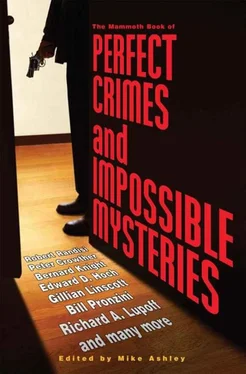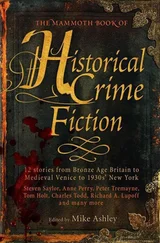Stern passed over the German Luger for our examination. “All I had was one blank cartridge in it.” I slid out the clip and confirmed that it was empty. “The mayor got the gun and uniform from a theatrical costume place in Boston.”
“It was the mayor’s idea?” I asked.
“Well, he was talking about something like that to start things with a bang. I volunteered to play a Nazi and fire a blank at him.”
The facts were clear-cut and I would have been awfully surprised if the autopsy showed Rusty Wagner had been poisoned or choked to death. It didn’t. By the following morning we knew that he’d died of a heart attack. There was no wound anywhere on his body.
Still, I stopped by the mayor’s office to have a talk with him. “Apparently the man had a weak heart,” I said. “Maybe that’s what kept him out of the army, that and his age.”
“It’s just a tragedy it had to happen here,” Mayor Bensmith said. “He could have dropped dead in Boston just as well.”
“Tell me something. Did you explain to Wagner exactly what you had planned, with the Nazi officer and all? Did he know someone would fire a blank cartridge at him?”
“Certainly. I went over every bit of it with him as soon as he arrived. My secretary, Rita, was with us at the time.” He called her into the office. “Rita, what did I tell Rusty Wagner when we met him at the station?”
Rita Innes was a prim middle-aged woman who’d worked in Bensmith’s office at the farm before his election as mayor. He’d taken her with him to the elective office and she’d settled in well. Now she answered, “You explained about the man dressed as a Nazi who’d fire a blank at him. He’d fall to the stage and you’d tell the audience to buy bonds. He wasn’t surprised. He said he’d acted out scenes for audiences in other cities, too.”
“The heart attack was just a coincidence, happening when it did,” Bensmith decided.
I had to agree with him. From both a medical and a legal viewpoint, there’d been no crime.
Wagner’s death had completely overshadowed the war-bond auction, and it was a couple of days later before I saw Vera Lens and remembered to ask her about it. “We did well,” she reported, “considering everything.”
“Who bought that door from the Black Cloister?”
“Funny you should ask. It went to a man named Jack Mitchell. He was Rusty Wagner’s manager and was making the tour with him. The door’s still here. We’re supposed to ship it to him in California.”
On the following Monday, the day after Easter, I was driving past the ruins of the old Cloister and decided to stop. Walking through the high grass to the gaping front entrance, I found a roof partly burned through, and weathered walls still showing scars from the fire. There was evidence of children playing there, and ground into the dirt out back I found a used shotgun shell. Every farm family kept a weapon close at hand. There were always varmints on the prowl.
After lunch I stopped in to see Sheriff Lens at his office. “I drove by the Black Cloister this morning and took a look. Can you tell me any more about the fire and your investigation?”
The sheriff gave one of his familiar sighs. “Doc, there’s no crime for you to solve, neither here nor back in nineteen twenty-one. That Rusty Wagner could be killed by a shot from a blank cartridge isn’t an impossible crime, it’s no crime at all!”
“Let’s get back to the Cloister fire for the moment. Tell me about the young man who died there.”
He went over to the file and opened the bottom drawer. “I haven’t looked at that folder myself in years. Probably should have discarded it after all this time.” Opening the slender file, he took out some papers and a few photographs. “The victim’s name was Fritz Heck. He was eighteen, same age as Wagner. Nice-looking fellow. That’s him on the right in this photo.”
“Is this Wagner with him?”
“No, it’s Heck’s younger brother.”
I nodded. “I should have guessed that from the resemblance.”
“We got the photo from the family in Hartford, for identification purposes. There was no doubt it was him, though. Heck’s finger-prints were on file with the Hartford police. Him and Wagner stole a car but didn’t know much about driving it.”
“How did the fire start?”
“Wagner told me they were preparing dinner, chatting about a girl they’d met in town, when Heck got careless and some hot grease caught fire. They tossed water on it but that just spread it around. The flames went up along the ceiling and into the living room.” He referred to his notes and Wagner’s statement. “Heck ran into the living room and tried to beat it out, but it was too late. He was trapped by the fire and smoke, and died inside the front door, trying to get it open.”
“Why is the house still standing after all these years?”
Sheriff Lens shrugged. “I heard tell Heck’s family bought it, wanted it as a memorial to their son. But they never did anything except pay the taxes.”
“Did you ever meet any of them?”
He shook his head. “If they came here I didn’t see them. Of course the body was shipped back to Hartford for burial.”
“What about Rusty Wagner? What happened to him after the fire?”
“They took him back to Hartford, too, for treatment of his burns. We heard later that he moved to New York and was in a play. Mayor Bensmith was a friend of his and stayed in touch over the years.” He squinted at me over the tops of his glasses. “You’re tryin’ to make something out of all this, aren’t you?”
“I’m trying,” I agreed with a smile. I picked up the snapshot of Fritz Heck and studied it. “Do you have an autopsy report there?”
“Well, not really. Back in 1921, Northmont’s coroner was just a local sawbones eager to make a few extra bucks. He just had to look at the body to know the fire killed Heck. The Hartford police furnished us with medical records on the two boys, though.”
He passed them over to me and I glanced quickly through them. There were the usual childhood illnesses, plus a serious bout of influenza for Heck during the nineteen epidemic. Wagner had suffered from rheumatic fever twice as a child, but had escaped the flu. “What else do you have there?”
“Just Wagner’s statement on the fire, which I’ve told you about. His face was burnt trying to save his friend.”
I thought about that. “Do you have a phone number for this manager of his, Jack Mitchell?”
“I think it’s here somewhere. Why do you want it?”
“Vera says he was high bidder on that Cloister door. It seems an odd thing to bother about when your client has just died.”
I phoned Mitchell’s West Coast office and after some delay was put through to him. “Mr Mitchell, this is Dr Hawthorne, back in Northmont. We’re still investigating Rusty Wagner’s unfortunate death.”
“Yes,” he replied. “I just got in the office. I’ve been making arrangements for the memorial service. What can I do for you?”
“I’m told that you were high bidder for the door from the Black Cloister, where Rusty lived for a time.”
“That’s correct. He wanted me to bid on it for him. It seemed very important to him. When the ambulance took him away I was hoping he was still alive. I entered my bid on the door before following him to the hospital.”
“What do you plan to do with the door?”
“Do with it?” his voice rasped over the phone. “Nothing. Now that he’s dead you can keep the door, auction it off again.”
“Did he have any reason for wanting it so badly?”
“None that I know of. He’d lived at that Cloister for one whole summer. I suppose it brought back memories.”
“I’m sure it did,” I agreed. “His friend died in the fire, and he was badly burned.”
Читать дальше











